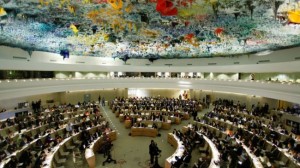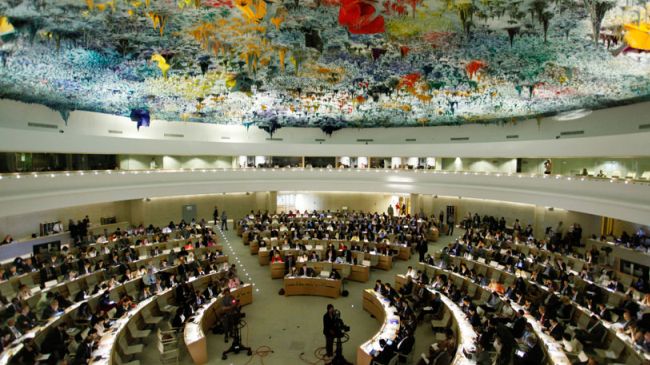 During the 26th session of the United Nations Human Rights Council, being held in Geneva until the 27th of June, the Cairo Institute for Human Rights Studies presented two Oral Interventions, the first on the 16th of June 2014 and the second on the 18th of June 2014.
During the 26th session of the United Nations Human Rights Council, being held in Geneva until the 27th of June, the Cairo Institute for Human Rights Studies presented two Oral Interventions, the first on the 16th of June 2014 and the second on the 18th of June 2014.
The first Oral Intervention presented by CIHRS, on behalf of the “Forum for Independent Egyptian Human Rights NGOs” commented on the report of the UN Special Rapporteur on Independence of Judges and Lawyers in which concerns were expressed about the recent judgment to sentence 25 individuals to 15 years in prison with a fine of 100,000 LE, the judgment to sentence the female human rights defender Mahinour El-Masry and seven other activists to two years in prison, as well as the mass death sentences pronounced by the Minya criminal court.
These sentences represent a flagrant violation of the rights to due process and fair trial and demonstrate the reluctance of the current judiciary to ensure proper accountability and due process. They also reveal the increasing use of the justice system in Egypt as a tool of political repression in an ongoing, unprecedented crackdown on all forms of dissent in the country. The Egyptian justice system has demonstrated almost zero tolerance for any form of dissent, banning opposition groups including the 6th of April movement and issuing arrest warrants against journalists, political opposition, and members of youth movements. In addition, the public prosecutor has begun issuing thousands of arrest warrants without conducting the required prior investigations.
During the Intervention, the forum assured that advancing democracy and stability in Egypt will greatly depend on the ability of the justice system to demonstrate impartiality and independence when investigating abuses of such magnitude.
The Second Oral Intervention presented by CIHRS commented on the Special Rapporteur on the promotion and protection of the right to freedom of opinion and expression’s report, on the realization of the right to freedom of opinion and expression in electoral contexts. CIHRS welcomed the report and highlighted the importance of freedom of expression, noting that it is a key component to free and fair electoral processes. During the Intervention, CIHRS confirmed that ballots do not achieve democracy unless core rights are respected – where individuals have access both to their civil and political rights.
On the same note, CIHRS referred to recent experiences in the Middle East and North Africa, where there have been and will be elections in Tunisia, Libya, Egypt, Algeria, Syria, Lebanon, Iraq and Yemen, as having driven home the point that the success of democratic processes is not only about the casting of ballots on election day but is first and foremost about the context surrounding the elections. Censorship, intimidation, and attacks against journalists; societal and governmental discrimination and restrictions on the work of human rights NGOs; and political violence and the use of economic power by certain groups to gain political influence remain core systemic barriers that hinder free, transparent, and fair electoral processes. The lack of plurality and transparency witnessed in some of these electoral processes has demonstrated clearly that the mere holding of elections should not be equated with a meaningful democratic process.
Attachments
CIHRS OI commented on the report of the UN Special Rapporteur on Independence of Judges and Lawyers
Share this Post

